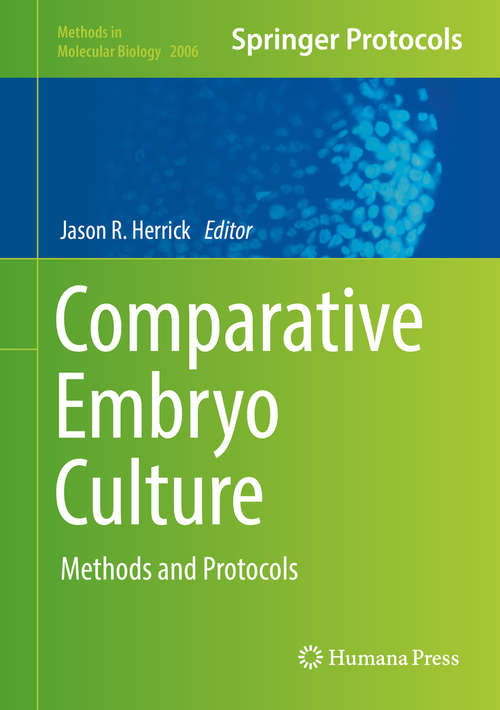Comparative Embryo Culture: Methods and Protocols (1st ed. 2019) (Methods in Molecular Biology #2006)
By:
Sign Up Now!
Already a Member? Log In
You must be logged into Bookshare to access this title.
Learn about membership options,
or view our freely available titles.
- Synopsis
- This detailed volume contains embryo culture techniques that should inspire embryologists to consider comparative studies. The species included in this volume represent a broad range of taxa, whose embryos have vastly different culture requirements and developmental characteristics. Among the species described in this volume, significant differences exist in the rates of cell division, the timing of the maternal to embryonic transition, the relative lipid content of the cytoplasm, the sensitivity of the embryo to specific environmental ions, the preferred nutrients and associated metabolic pathways used by the embryo, the timing and mechanisms of early lineage specification, the presence or absence of embryonic diapause, and the time from fertilization to implantation. Written for the highly successful Methods in Molecular Biology series, chapters include introduction to their respective topics, lists of the necessary materials and reagents, step-by-step, readily reproducible protocols, and tips on troubleshooting and avoiding known pitfalls. Authoritative and practical, Comparative Embryo Culture: Methods and Protocols serves as an ideal aid for scientists seeking another species whose embryos have evolved a unique mechanism that could provide a valuable, comparative context for experimentation.
- Copyright:
- 2019
Book Details
- Book Quality:
- Publisher Quality
- ISBN-13:
- 9781493995660
- Related ISBNs:
- 9781493995653
- Publisher:
- Springer New York
- Date of Addition:
- 08/07/19
- Copyrighted By:
- Springer
- Adult content:
- No
- Language:
- English
- Has Image Descriptions:
- No
- Categories:
- Nonfiction, Science, Animals
- Submitted By:
- Bookshare Staff
- Usage Restrictions:
- This is a copyrighted book.
- Edited by:
- Jason R. Herrick
